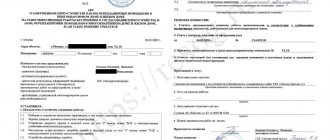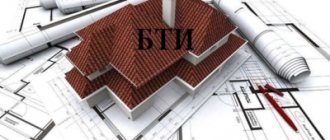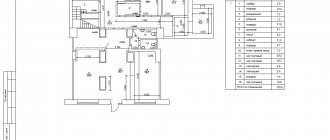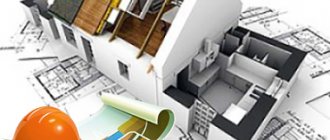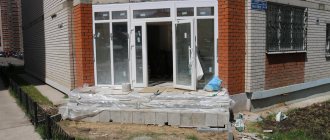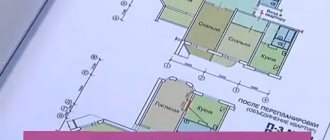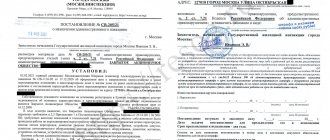Shops, hairdressers, clinics and other small businesses on the ground floors of residential buildings or large shopping centers have long been familiar to the eyes of any city dweller. Just like apartments or private houses, they have a fixed layout, which the owners cannot completely change at their discretion. This article provides answers to the question of what illegal redevelopment of non-residential premises is, how to legalize it if possible, and what are the consequences of unauthorized repairs in 2021.
Liability and fines for illegal work
When redevelopment of non-residential premises is carried out without the required documentary approval and design plans, the owner bears administrative responsibility in accordance with the Code of Administrative Offenses of the Russian Federation.
The illegality of work is discussed in Article 7.24, part 2, according to which a fine is imposed:
- for a civilian – from 1000 to 1500 rubles;
- for an official – from 2000 to 3000 rubles;
- for a legal entity - from 20,000 to 30,000 rubles.
Along with monetary punishment, the violator is obliged to return the object to its original state or to legitimize unauthorized changes.
When do you need to pay a fine?
An administrative fine issued for unauthorized redevelopment in an apartment must be paid in full within 60 days - this is stated in Part 1 of Art. 32.2 Code of Administrative Offenses of the Russian Federation.
An example of timing calculation. Let's say the housing inspector issued you a decree to pay a fine on the evening of February 4, 2021. The next day, that is, February 5, the 10-day period for appealing the fine begins. This period continues even if you do not plan to challenge the fine. The deadline for paying the fine will begin on February 15. Add 60 days (2 months) and get April 16, 2021. By this date, you must fully pay off the fine for unauthorized redevelopment.
What are the consequences of not paying a fine?
If the requirement is not fulfilled, the housing inspectorate will file a lawsuit, and then the bailiffs will deal with the collection.
Failure to pay the fine within 60 days may result in punishment under Part 1 of Art. 20.25 Code of Administrative Offenses of the Russian Federation:
- The home owner will have to pay a double fine, for example – 2,500 rubles for the first fine + 5,000 rubles (double amount) – a total of 7,500 rubles;
- The court places the defaulter under arrest for 15 days;
- Mandatory work up to 50 hours.
The judge will look at mitigating and aggravating factors. If the violator does not make contact, has overdue the fine and does not admit guilt at all, he may be arrested. It’s not worth letting it come to this!
How to legitimize actions?
Administrative approval for the redevelopment of non-residential premises is carried out in accordance with the requirements of the residential complex (Federal Law No. 188) in several stages:
- Preparation of the project (what is a redevelopment project, what does it consist of and what is it needed for?).
- Preparation of technical documentation.
- Contacting government agencies and obtaining consent to work.
- Carrying out repair work.
- Receiving a certificate from the admissions committee.
- Inspection of the property by a cadastral engineer.
- Registration of changes in cadastral registration.
Where to apply for permission?
Making a project requires careful preparation and knowledge; you can do it yourself by visiting the following authorities:
- Rospotrebnadzor;
- fire supervision;
- Committee on Urban Planning and Architecture;
- Committee for the Protection of Architectural Monuments (if required);
- housing inspection.
You can also entrust documentary planning to a private real estate company, which will help with the design of the project. Each authority reviews the applicant’s request and documents and issues a general conclusion. The voting results can be recorded in a free-form protocol.
We talked more about the procedure for obtaining permission to redevelop non-residential premises in this material.
What documents should I provide?
After receiving the project, the owner applies to the urban planning department of the municipality of the locality with the following documents:
- statement;
- passport of the applicant (owner or authorized representative) or constituent documents for legal entities;
- design documentation;
- certificate of ownership;
- technical passport of the building/premises;
- conclusion of regulatory authorities.
After receiving permission, the owner has the right to carry out planned construction work and redevelopment in accordance with the design and technical conclusion, while it is prohibited to deviate from the requirements specified in the documents.
The work is checked and accepted by a cadastral engineer, who records changes in the technical passport. To call a specialist after construction is completed, contact the BTI. If no deviations from the project requirements are found, a report on hidden work and a report on completed redevelopment are drawn up.
With the received act, the owner applies to the final authority - Rosreestr, where the property is cadastrally registered or changes are registered in the register. From this moment on, the redevelopment is considered legal. The owner of the non-residential premises is given an extract from the Unified State Register of Real Estate.
Deadlines
The current legislation establishes the time frame for consideration of an application:
- approval will take 1 month;
- for final registration - 3 months.
Price
The cost of legalizing redevelopment depends on the following factors:
- region of location of the immovable property;
- square footage of the room;
- type of redevelopment;
- calling specialists;
- contacting a lawyer.
On average, by region for redevelopment (documentary approval) you will have to pay the following amounts:
- purchase of a standard project – 15,000-30,000 rubles;
- purchase of an individual project – up to 150,000 rubles;
- approval – 30,000 rubles;
- for each document 2000 rubles.
What is illegal redevelopment
Important! Making significant changes to the design of a building without permission is grounds for charging a fine, and its size varies significantly for individuals or enterprises, and if the law is violated again, the sanctions increase significantly.
Redevelopment work should begin only if there is an appropriate plan and agreement with the Housing Inspectorate, BTI and the regional administration. If there is no permission, then the work is illegal.
What happens if you carry out unauthorized redevelopment? Watch in this video:
A permit must be issued when performing work:
- the formation of openings in walls or partitions that are load-bearing;
- installation of stairs;
- changing the location of various plumbing fixtures;
- removal of a loggia, vestibule or any extensions to the house;
- combining several rooms.
Important! There are certain works for which you do not need to obtain a permit, but they are quite simple, for example, glazing a loggia or carrying out cosmetic repairs, creating a door opening in a non-load-bearing wall or building a non-load-bearing partition.
Legal settlement
If the town planning department refuses to give a citizen consent to carry out redevelopment, he can file a claim in court. If the redevelopment complies with legal standards, then the court will issue a positive response to the owner for construction work.
Where to contact?
To initiate a lawsuit, you must apply to the district court with a claim to legalize the redevelopment. The basis for the appeal is Article 29 of the Housing Code on the consequences of unauthorized redevelopment.
What documents should I provide?
Along with the statement of claim, the owner provides a package of documents:
- refusal of the administration to approve;
- personal documents of the applicant;
- certificate of ownership of real estate;
- new and old technical data sheet with changes displayed;
- receipt of payment of state duty;
- extract from the Unified State Register of Real Estate;
- When the premises are located in an apartment building, plans of neighboring apartments (above and below) are provided; they can be requested from the design and inventory bureau.
Deadlines
The court considers the application within 10 working days, after which it appoints a construction and technical examination. On the appointed day, the commission evaluates the housing for compliance with the following standards:
- sanitary;
- firefighters;
- construction
If they comply, a conclusion is issued on the admissibility of the safety of the redevelopment. If the decision is negative, the inspector will issue a refusal indicating the reasons . Then the owner can appeal to the court after eliminating the violations, for example, when replacing the floor, waterproofing was not installed - it needs to be corrected. From the beginning of the judicial review to the receipt of the certificate of compliance, it takes from 1-3 months, taking into account construction work.
Price
Filing a claim is accompanied by payment of a state fee, which is 1000 rubles.
Where to go in case of illegal redevelopment
In order to legitimize the previously made changes, it is necessary to engage in its approval. To do this, you need to contact the Housing Inspectorate or the regional administration. At the same time, you need to be sure that all adjustments do not violate basic building codes, otherwise it will be impossible to obtain approval.
Often the Housing Inspectorate refuses to issue a permit, and in this case the only option to solve the problem is to go to court. For approval, you will need to create a redevelopment project, as well as draw a diagram. It is advisable to contact the relevant design organizations regarding this.
How to obtain permission for the reconstruction of capital construction projects? See here.
Upon approval, the premises will be visited by employees of the inspectorate and other organizations to ensure that all changes are reliable, safe and comply with standards.
If there are violations, then it will not be possible to obtain permission, so all structures will have to be changed in accordance with the requirements.
Important! If there is an unauthorized redevelopment, it is almost impossible to sell the apartment, since buyers will easily notice inconsistencies in the technical plan issued by the BTI with the real appearance of the premises.
Therefore, it is advisable to obtain permission before making major changes to the design of the facility. This may take a long time, but it will prevent various problems in the future.
Difference in procedure in an apartment building and another building
The cost of the work carried out and the procedure for registering redevelopment depend on the location of the non-residential premises:
| In a non-residential building | In an apartment building |
| Reconstruction and major repairs are not coordinated with the administration, but it is necessary to correctly qualify the extent of the work performed so as not to make illegal changes to the building plan. It is easier to obtain permission for placement in a non-residential building. | Before starting work, it is required to hold a meeting of residents, where neighboring owners must agree to make changes and make sure that the redevelopment will not disrupt the layout of their apartments. |
Learn about the important legal nuances of reconstruction and redevelopment of non-residential premises in an apartment building and a non-residential building.
Consequences of violations
If you do not obtain permission to make major changes to the design of the premises, this will be considered an unauthorized redevelopment.
The discovery of such a significant violation is fraught with the application of certain penalties for the owner of the property.
Important! Usually, the fact of illegal redevelopment is discovered during inspections by employees of the Housing Inspectorate or when selling the property, since its actual condition will differ from the information contained in the technical plan.
Housing Code on redevelopment.
Unauthorized redevelopment leads to different penalties:
- imposition of significant fines;
- forced removal of changes made;
- If they refuse to comply with the authorities' demands, property owners may lose their premises.
Therefore, after paying the fine, it is important to start processing the changes made.
How violators are held accountable
If an illegal redevelopment is detected, the Housing Inspectorate employee will take certain actions against the violator:
- Initially, an appropriate fine will be imposed. To do this, inspectors are guided by Art. 7.21 of the Code of Administrative Offenses, which states that individuals are charged a fine of 2 to 2.5 thousand rubles.
Article 7.21. Violation of the rules for the use of residential premises
1. Damage to residential buildings, residential premises, as well as damage to their equipment, unauthorized reconstruction and (or) redevelopment of residential buildings and (or) residential premises or their use for other purposes - entails a warning or the imposition of an administrative fine on citizens in the amount of one thousand up to one thousand five hundred rubles.
2. Unauthorized redevelopment of residential premises in apartment buildings - entails the imposition of an administrative fine on citizens in the amount of two thousand to two thousand five hundred rubles.
- Next, an order is drawn up, on the basis of which the owner of the object must eliminate all changes made, so the object must return to its previous form. It is possible to legalize this redevelopment through the court at this stage, but it will be necessary to prove that all changes are safe. We also need objective explanations why all adjustments were not officially recorded within the established time frame.
- If within the allotted time the premises are not returned to their original form and the redevelopment is not registered, then government officials have the right to seize the property from the owner, after which it is sold at public auction.
The decision regarding this process is made by the court. The bidding is represented by a special auction, and any individual or enterprise can become a participant. As soon as the apartment is registered in the name of the winning bidder, the previous owner must leave the property, and at the same time he receives the amount paid by the new owner for the property.The costs of enforcement proceedings are pre-deducted from this fee.
Important! Fines and the need to restore the premises to their original form can be used not only against property owners, but also against tenants, and if they refuse to perform these actions, the rental agreement is terminated, so the responsibility for restoring the property passes to the owner.
Refusal of approval
The town planning department may refuse the owner to legalize the redevelopment on the following grounds:
- Government departments do not have sufficient information about the premises - in this case, the applicant is obliged to provide the necessary package of documents within 15 days.
- The changes do not meet the requirements, violate building codes, do not comply with GOST and SNiP, and are dangerous - in this case, the applicant may be fined and required to return the premises to its original form or legitimize another project of construction changes.
- The project prohibits redevelopment - the applicant will receive a refusal and will not be able to carry out construction work due to the technical condition of the building and the inability to do this.
- The Department of Culture issued a refusal to carry out the redevelopment due to the specifics of the building, when the house is a cultural heritage monument. In the refusal, the administration will indicate the reason and type of violation. The applicant will not be able to make changes, and if they are made illegally, they will be fined.
The received refusal can be challenged in court only if the applicant is confident in the legality of the changes made or in compliance of the redevelopment with state requirements.
A sufficient list of grounds for refusal to approve construction changes is indicated in Part 1 of Article 27 of the Housing Code of the Russian Federation.
Redevelopment, redevelopment and reconstruction of non-residential buildings and premises are concepts that are close in meaning, but different in essence. Our team will help you understand the following issues: what reconstruction is and how to arrange the entrance group to an apartment building.
Redevelopment of non-residential premises should be carried out after legalizing this process at the documentary level. For unauthorized changes to the floor plan, the owner bears administrative responsibility and is obliged to pay a fine; the citizen will also have to dismantle the construction amendments made or legalize a new construction/repair project.
Blog
Photo source: https://www.pexels.com/
Redevelopment of premises in an apartment building (AMD) is not uncommon. And not all owners consider it necessary to issue all permitting documentation. How can a management organization influence such situations, and what should it do?
In accordance with paragraph 1 of Art. 26 of the Housing Code of the Russian Federation (hereinafter referred to as the Housing Code of the Russian Federation), the reconstruction and (or) redevelopment of premises in an apartment building is carried out in compliance with the requirements of the law in agreement with the local government body (hereinafter referred to as the body carrying out the approval, local self-government body) on the basis of a decision made by it.
Clause 2 of this article of the Housing Code of the Russian Federation establishes a list of necessary documents that must be submitted to the local self-government body in order to carry out redevelopment or reconstruction of premises in an apartment building (MKD) in a legal way.
By virtue of paragraph 1 of Art. 29 of the RF Housing Code are unauthorized reconstruction and (or) redevelopment of premises in an apartment building, carried out in the absence of the grounds provided for in Part 6 of Article 26 of this Code, or in violation of the reconstruction and (or) redevelopment project submitted in accordance with paragraph 3 of Part 2 of Article 26 of this Code.
Clause 2 of Art. 29 of the Housing Code of the Russian Federation stipulates that a person who has unauthorizedly rearranged and (or) redesigned premises in an apartment building bears the responsibility provided for by law.
According to paragraph 3 of Art. 29 of the Housing Code of the Russian Federation, the owner of premises in an apartment building that was unauthorizedly rebuilt and (or) redesigned, or the tenant of residential premises under a social tenancy agreement, a rental agreement for residential premises of a social housing stock that was unauthorizedly reorganized and (or) redesigned, is obliged to provide such placement in its previous state within a reasonable time and in the manner established by the body carrying out the approval.
The actions of the body carrying out approvals in case of failure to comply with the order to return the premises to its previous state are regulated by paragraphs 5.6 of Art. 29 of the Housing Code of the Russian Federation, namely: if the corresponding premises in an apartment building are not restored to their previous condition within the period specified in Part 3 of this article in the manner established by the body carrying out the approval, the court at the claim of this body, provided that the decision provided for in Part 4 of this article is not made articles, makes a decision...
(hereinafter, the norm lists options for solutions up to the sale of the premises at public auction or the eviction of the tenant from the residential premises). It is also possible to leave the premises in their current condition (with redevelopment), which can also be decided by the court at the request of the owner or tenant if the redevelopment does not violate any norms or anyone’s rights.
Thus, the right to file claims in case of illegal planning of MKD premises belongs to the local self-government body represented by its body, which coordinates the redevelopment. However, it does not follow from this that the management organization can remain inactive when the fact of illegal redevelopment (reconstruction) is discovered, especially when they affect the common property of the apartment building.
I will not cite here the well-known norms of the Rules for the Maintenance of Common Property (CP) of MKD and the Housing Code of the Russian Federation, which oblige the management organization to maintain common property in proper condition and create favorable living conditions, as well as obliging them to monitor the condition of the common property, while recording all violations documented (by drawing up the relevant inspection reports of the equipment).
In principle, the law does not contain any powers of the management organization with which it could influence the violator in a situation with illegal redevelopment or reconstruction of premises in an apartment building. But when such facts are discovered, the management organization must carry out an extraordinary inspection of the common property of the apartment building, in which interested owners of the apartment building premises can also take part, documenting the inspection results with an act and making an entry in the inspection log of the apartment building.
Also, the management organization can, or rather is obliged to, send a written appeal to the owners (tenants) who carried out the redevelopment with a requirement to provide permitting documentation, and in its absence, to bring the MKD premises to its previous state in accordance with the MKD design documentation.
In addition, in the absence of permitting documentation or failure to provide it to the management organization, it may initiate an appeal to the body that approves the redevelopment with a request to take measures on this fact, attaching relevant documents and correspondence.
Thus, the management organization does not have the powers that can force or oblige the persons who carried out the redevelopment to return the premises in the apartment building to its previous state, and it also does not have the right to file such a claim in court. The management organization may act as a third party in such cases when they are considered by the court if it is involved in the process.
In addition, she has the right to go to court if violations concern the common property of the apartment building, since she acts on behalf of the owners of the apartment building premises under the management agreement. But it is best to file such claims on behalf of loyal owners, taking part in the process through the legal service of the UO and as a third party in the process, since it is unknown whether the court will consider the UO the proper defendant (anything can happen).
Appeal ruling of the Investigative Committee for civil cases of the Altai Regional Court dated March 18, 2015 in case No. 33-2386/2015: the first instance rejected the owner’s claim to leave the remodeled premises in a redesigned form, since this does not violate any norms and rights of third parties persons The appeal changed the decision, satisfying the claim, with the exception of changing the loggia, which is the common property of the apartment building and reduces its area.
Appeal ruling of the Investigative Committee for civil cases of the Supreme Court of the Karachay-Cherkess Republic dated April 7, 2015 in case No. APL-158/2015:
According to the owner’s claim against another owner, the court ordered the latter to return the premises to its previous state, since the redevelopment affected the common property of the apartment building.
Appeal ruling of the Moscow City Court dated September 26, 2016 in case No. 33-37625/2016:
the court found that the defendant carried out unauthorized, in the absence of permitting documentation, redevelopment and fencing off part of the loggia premises belonging to the plaintiff, in connection with which the defendant is obliged to bring the loggia premises into compliance with the requirements of technical documentation and move the dividing partition of the loggia along the border with the plaintiff’s loggia to a certain distance towards the defendant’s apartment.
Determination of the Moscow City Court dated November 22, 2021 No. 33-46573/16
: according to the claim of the HOA, the court ordered the owner to return the common areas of the apartment building to their previous condition.
Ruling of the Supreme Court of the Russian Federation dated May 24, 2016 in case No. 305-KG15-20305:
the refusal of the body authorized to make decisions on the approval of the reconstruction and (or) redevelopment of the premises may be recognized by the court as unlawful if all the necessary documents are submitted, and the reconstruction and (or) redevelopment carried out comply with the requirements of the law.
Ruling of the Supreme Court of the Russian Federation dated May 30, 2016 N 307-ES16-5924 in case No. A56-73617/2013: according to the claim of the administration against the HOA, the court ordered the attic floor, which is the common property of the apartment building, to be restored to its original condition.
Interesting in the light of the topic under consideration is case No.
2-717/2019, the decision on which was made on August 2, 2019 by the Chertanovsky District Court of Moscow
. As a result of the flood, the apartment above was damaged by neighbors, the owners of which filed a claim for damages. The court satisfied the victims' claims with the exception of moral damages. At the same time, the affected neighbors carried out illegal redevelopment, as a result of which the damage was significantly greater than if such redevelopment had not occurred, as indicated by the defendant. The court did not agree with the defendant and made a decision not in his favor. The case was not considered by the appellate court.
As can be seen from the above court decisions, a homeowners association or management company can be both a plaintiff and a defendant when it comes to the common property of an apartment building. If the redevelopment or reconstruction of the premises was carried out illegally in a residential or non-residential premises, the body carrying out the approval has the right to file a claim.
Summarizing the above, we can draw the following conclusions. In any other way to influence the violators of the law, except by: conducting an extraordinary inspection of the common property of the apartment building, sending letters to them about the need to bring the premises to its previous condition in the absence of permits, the management organization cannot influence the situation due to the lack of legal grounds for this. In addition, the specified letter from the MA can be ignored by violators without imposing any responsibility on them for this. If the case concerns the common property of an apartment building, the management company can be a plaintiff, but it is better to file claims on behalf of loyal owners.
Sincerely, Ilmira Nosik.
has developed a unique CRM system for management companies and homeowners associations. All the necessary information about the service is here
.
Lawyer's answers to private questions
Can I pay a fine and legalize the redevelopment of the apartment?
Yes, but only if there is no threat to the health and lives of other people. Not every redevelopment can be legitimized “in fact.” You can be informed about the prospects for legalization by the BTI, the housing inspectorate or the architectural department. It is also worth involving designers. They will tell you whether your changes comply with building regulations. If yes, prepare a project, collect documents and go to the MFC for approval.
A neighbor is threatening to complain to the management company about the redevelopment of our apartment. We don't let her into our home. Can they come to us with an inspection and issue a fine for repairs?
There are risks. Supervisory authorities are obliged to respond to any complaint from neighbors. Therefore, if your neighbor complains to the management company, homeowners association or directly to the housing inspectorate, most likely you should wait for “guests”. You will be notified in advance by registered mail 30 days before the visit. It is better not to ignore the notices, because after 2 unanswered notices, the supervisory authority has the right to go to court and come with bailiffs. But whether a fine will be issued or not depends on the nature of the changes. If they don't violate anything, then there shouldn't be any problems. In other cases, a fine is the minimum punishment.
If the premises have already been purchased with unauthorized redevelopment
In some cases, the owner learns about the redevelopment after purchasing the property (the redevelopment was carried out by the previous owner). In such a situation, the main thing is to react quickly. According to current rules, the transfer of ownership does not cancel the need to pay a fine. And the old owner will pay it.
The new owner must immediately initiate the procedure for legalizing the redevelopment. Otherwise, he will also be forced to pay a fine and risk his ownership of the purchased property.
Illegal redevelopment almost always leads to serious problems and fines. At a free consultation, experienced lawyers will tell you what you need to consider and what points you should pay attention to. They can also represent the client’s interests both when interacting with regulatory authorities and when going to court.
FREE CONSULTATIONS are available for you! If you want to solve exactly your problem, then
:
- describe your situation to a lawyer in an online chat;
- write a question in the form below;
- call Moscow and Moscow region
- call St. Petersburg and region
Save or share the link on social networks
(
1 ratings, average: 5.00 out of 5)
Author of the article
Natalya Fomicheva
Website expert lawyer. 10 years of experience. Inheritance matters. Family disputes. Housing and land law.
Ask a question Author's rating
Articles written
513
- FREE for a lawyer!
Write your question, our lawyer will prepare an answer for FREE and call you back in 5 minutes.
By submitting data you agree to the Consent to PD processing, PD Processing Policy and User Agreement
Useful information on the topic
Documents for redevelopment of an apartment in the MFC
Often the basic layout of an apartment does not meet the requirements or design of it...
What is the fine?
The size of the fine for illegal redevelopment of the entire building, individual rooms, balconies, building facades, and so on depends on who exactly the violator is: an individual or a legal entity.
It must be remembered that a fine is not the most global problem against the background of possible confiscation of property.
For individuals
Penalties affecting individuals are described in Article 7.21 of the Code of Administrative Offenses of the Russian Federation:
- Minimum fine: 2000 rubles.
- Maximum fine: 2500 rubles.
Given the virtually non-existent difference between the minimum and maximum indicators, most often responsible persons impose as large a fine as possible. In this case – 2500 rubles.
For legal entities
With legal entities the situation is somewhat more complicated. The legislation does not strictly indicate how much companies, firms and organizations must pay in case of violation. To determine potential amounts, you will have to focus on local legislation relevant to the region where the property is located. As an example, here are the fines that are relevant in Moscow on the basis of Article 9.12 of the Moscow Code:
- Fine for officials who allowed redevelopment: from 5 to 50 thousand rubles.
- Fine for legal entities: from 300 to 350 thousand rubles.
The amounts are already more significant, so there is no point in waiting and hoping that the offender will be forgotten.
Is unauthorized reorganization possible?
It is worth understanding that redevelopment is a long process and requires not only time to collect the necessary documentation, but also material costs.
Redevelopment of non-residential premises - the procedure is strictly formalized and consists of several mandatory stages.
Let's consider the types of work that relate to the redevelopment of the premises:
- installation of walls;
- changing the location of sanitary zones;
- transfer, demolition and installation of auxiliary elements;
- increasing or decreasing the size of window openings;
- installation of equipment requiring connection of communication networks;
- changing the design of the floor base;
- installation or dismantling of staircases;
- connection of communications.
All types of redevelopment of premises require permission, which can be obtained from government agencies.
More information about the redevelopment, redevelopment and reconstruction of non-residential buildings and premises can be found here, and in more detail about when work approval is needed and how the procedure works, you can read in this material.
